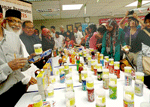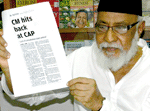Malaysia
Published on Thu, 2013-04-04 11:52
According to government data, Malaysia is said to be on the way towards achieving all eight MDGs; commitment is reflected in the Tenth Malaysia Plan (2011-2015). But Malaysia’s development trajectory has hitherto primarily been driven by a combination of low worker wages amidst high revenues for petroleum, palm oil and rubber commodities and foreign direct investment in the manufacturing sector. In other words, very little of the profits in the form of oil royalties, for example, have gone towards developing the states that produce a large bulk of the oil, such as Kelantan, Terengganu, Sabah and Sarawak, but which happen also to be the poorest states in Malaysia. And while the government announced its motto to be “People First, Performance Now” and its goals to reduce crime; fight corruption; improve student outcomes; raise living standards of low-income households; improving rural basic infrastructure; and improve urban public transport, it appears that while lip-service has been paid, little pertaining to the structural and systemic inequities, inequalities and injustices of the political or social economy have been dealt with or addressed with any substance. Malaysia’s inadequate financial, technological and market infrastructure and human capital have been pinpointed as reasons why it cannot compete in economically higher-value-added products and services. |
|
In 2012, the all-consuming question has been, “who will lead Malaysia after its 13th general elections?” So much so that questions of substance as to what policies and principles will be in place and how and in which direction the country will be governed after the polls, have been downgraded. Fears of losing electoral and political support by instituting – or championing – drastic changes have prevented crucial questions from being addressed. Even reformist-minded politicians have not been able to articulate a different development trajectory and model than that of the incumbent government. However, a bright spot has emerged: a nascent ‘green’ movement steered by grassroots civil society leaders but empowered by tens of thousands of ordinary citizens who have not been cowed from rallying onto the streets of Malaysia to make their concerns known about the world they want.
|
Published on Wed, 2012-08-01 08:38
More than thirty non-governmental organizations have come together to warn against Malaysian government’s plan to build two nuclear reactors without consulting the public. Some of the supporters of the statement are the Consumers’ Association of Penang, Third World Network, Sahabat Alam Malaysia, Tenaganita, TERAS Pengupayaan Melayu, Women’s Aid Organization, Centre for Independent Journalism and Stop Lynas Coalition. |
Published on Thu, 2012-07-19 10:09
Visitors at the Penang Hospital learn about good eating habits when they stroll through the healthy lifestyle exhibition organized by the Consumers Association of Penang (CAP) that ends on Friday 20. The event is aimed to raise awareness on the consumption of foods rich in sugar, fat, salt and chemicals that led to obesity among Malaysians. Some worrying trends: Malaysians are the eight highest sugar users in the world, they are getting used to keep awake till late and meat is fast becoming a staple food. |
Published on Fri, 2012-06-08 11:17
The Consumers Association of Penang (CAP) and Sahabat Alam Malaysia (SAM) warned that the beauty of this Malaysian state natural environment is slowly losing its shine due to the rapid pace of unsustainable development. |
Published on Wed, 2012-03-21 08:30
The Consumers Association of Penang (CAP, a member of the Malaysian Social Watch coalition) is complaining on the lack of public consultation by the Penang state government regarding several mega projects that include the construction of a 6.5 km undersea tunnel, a 12 km road and two bypasses of more than 4.0 km. |
|
Published on Thu, 2012-03-15 11:07
In terms of gender equity Malaysia is in the very bottom of the East Asia & the Pacific region. This is made apparent by the publication of the Gender Equity Index (GEI) 2012, published by Social Watch on the eve of Women’s International Day, March 8. |
Published on Wed, 2012-02-15 07:36
Penang-based Consumers Association of Penang has urged the Domestic Trade, Co-operatives and Consumerism ministry to immediately enforce the Price Control and Anti-Profiteering Act 2010 on eateries charging excessively for plain water. |
Published on Thu, 2012-01-26 07:45
Do you want to know the secret of growing big and healthy vegetables without a drop of chemical fertiliser? The Consumers Association of Penang's (CAP, one of the focal points of Social Watch in Malaysia) teaches you how to do it at its organic garden on Jalan Mesjid Negeri. Using its own vermicompost and fertilisers, CAP has produced bottle gourds weighing 4kg and measuring 46cm within 40 days. "Panchakavya organic growth promoters and earthworm fertilisers were used to grow these bottle gourds," said CAP education officer N.V. Subbarow. |
Published on Tue, 2012-01-10 14:08
The government of Malaysia continues studying the introduction of nuclear energy, in spite of the warnings launched by 14 national civil society groups and others from Korea, Australia and specially Japan after the Fukushima tragedy. An alliance formed by groups of nearby countries, along with three based in Malaysia --the Third World Network and the Consumers Association of Penang (member of Social Watch) and the national chapter of Friends of the Earth International--, called on the Prime Minister Najib Tun Razak’s government to stop its nuclear power development plan. |











